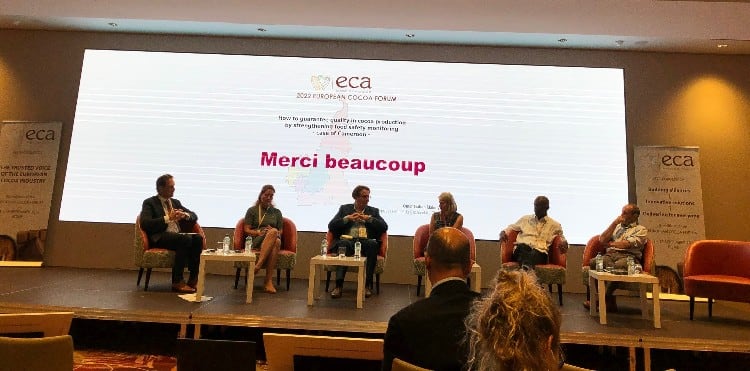The announcement came in a joint statement from the ECA, Rome Association of Chocolate, and the Biscuit and Confectionery Industries of Europe (CAOBISCO) on the last day of ECA Forum in Rome.
The new data collection effort will feed into a combined database that is owned and driven by producing countries, in compliance with EU and national data privacy legislation, with the aim of achieving a robust nationwide traceability system.
In the past years, cocoa and chocolate producing companies have mapped many of the geographic locations of farms from which they are directly sourcing, in order to ensure that this cocoa was not sourced from deforested areas.
The announcement comes at a time when legislative developments in producing and consuming countries alike have generated significant momentum to create more coordinated action to achieve national sector-wide traceability systems in specific origins.
The upcoming EU Regulation on deforestation-free products and EU Directive on Corporate Sustainability Due Diligence, the Alliance on Sustainable Cocoa Roadmap endorsed by European, Ghanaian, and Ivorian stakeholders, and the establishment of an Economic Pact for Sustainable Cocoa by the Côte d’Ivoire-Ghana Cocoa Initiative – all share the belief in traceability as an underpinning for their environmental, social and economic objectives.
ECA President Paul Davis and CAOBISCO President Aldo Cristiano told delegates: “The European Cocoa and Chocolate Industries are fully committed to addressing and contributing to the successful implementation of a functional system of regional and national cocoa farm traceability that wil promote the objective of ensuring that products are deforestation-free when entering the EU single market.
“ECA and CAOBISCO are very much aligned with the EU’s objectives, and we believe that by working in close collaboration with our partners in producing countries and by sharing common environmental goals, we can achieve optimal outcomes and create a win-win situation for all the actors of the cocoa and chocolate sectors, including for the millions of farmers upon whom confidence in their products depends. Improved provenance in the origination of cocoa will further enhance our shared commitment to achieving sustained economic, social, and environmental progression in those sectors.“
Compiling individual company datasets into an overarching database, and making it available to producing countries’ authorities, will be a material addition to establishing robust cocoa traceability in Cote d’Ivoire and Ghana.
For a fully traceable cocoa supply chain, it would be required for Cote d’Ivoire and Ghana to mandate traceability to all the cocoa sourcing companies active in their markets.
With this announcement, ECA and CAOBISCO said it shows the commitment of their respective industries to increase the sustainability of the cocoa value chain.
ECA and CAOBISCO made their announcement on the occasion of the eighth ECA Forum, held this week in Rome. The triennial event gathered more than 400 stakeholders in the cocoa value chain – European cocoa and chocolate industry, cocoa producing countries, European and international institutions, academia, cocoa farmers' organisations and the broader civil society.
This year’s edition focused on traceability as a key enabler for sustainability in cocoa, and on strategies to accelerate the achievement of nation-wide traceability systems in producing countries.


